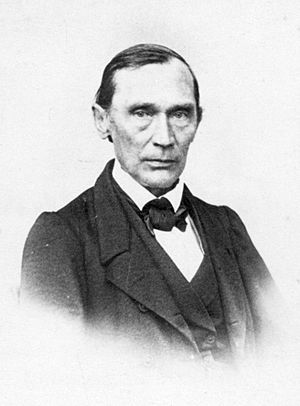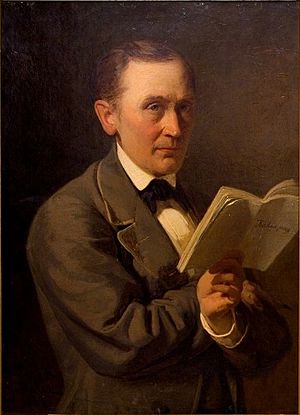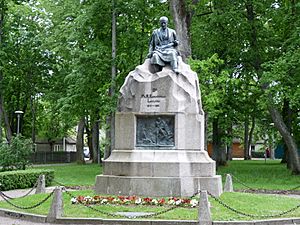Friedrich Reinhold Kreutzwald facts for kids
Quick facts for kids
Friedrich Reinhold Kreutzwald
|
|
|---|---|
 |
|
| Born | 26 December [O.S. 14 December] 1803 Jömper Manor, Jömper, Kreis Wierland, Governorate of Estonia, Russian Empire
(in present-day Jõepere, Lääne-Viru County, Estonia) |
| Died | 25 August [O.S. 13 August] 1882 (aged 78) Dorpat, Kreis Dorpat, Governorate of Livonia , Russian Empire
(present-day Tartu, Tartu County, Estonia) |
| Resting place | Raadi cemetery |
| Occupation | Writer |
| Movement | Estonian national awakening |
Friedrich Reinhold Kreutzwald (born 26 December 1803 – died 25 August 1882) was an important Estonian writer. Many people see him as the father of Estonia's national literature. He is famous for writing the Estonian national epic called Kalevipoeg.
Who Was Friedrich Kreutzwald?
Friedrich Reinhold Kreutzwald was born in 1803. His parents were serfs on the Jömper estate in what is now Estonia. Serfs were like workers who belonged to the land and its owner. They were not free to leave.
His father, Juhan, was a shoemaker and took care of the grain storage. His mother, Anne, worked as a chambermaid.
In 1815, his family became free from serfdom. This meant they could finally send young Friedrich to school. He started his education at the district school in Wesenberg (today called Rakvere).
His Education and Work
In 1820, Friedrich finished secondary school in Dorpat (now Tartu). After that, he worked as a teacher in an elementary school.
He then decided to study medicine. In 1833, he graduated from the Faculty of Medicine at the Imperial University of Dorpat.
Later that year, on August 18, he married Marie Elisabeth Saedler. From 1833 to 1877, he worked as a doctor in the town of Werro (now Võru). He was a member of many scientific societies across Europe. He also received special honors from several universities for his work.
His Important Writings
Kreutzwald wrote many books that taught good lessons. Most of these were translated into German. Some of his well-known works include Plague of Wine (1840) and The World and Some Things One Can Find in It (1848–49). He also wrote Estonian versions of popular stories like Reynard the Fox (1850) and Wise Men of Gotham (1857).
His most famous work is the national epic Kalevipoeg (meaning Kalev's Son). An epic is a long poem about heroes and their adventures. Kreutzwald used old stories and ideas that his friend Friedrich Robert Faehlmann had collected.
He also wrote many other works based on Estonian folklore, which are traditional stories and beliefs. One example is Old Estonian Fairy-Tales (1866). He also wrote collections of poems and a long poem called Lembitu (1885), which was published after he died.
Friedrich Kreutzwald is often seen as the author of the first truly Estonian book. He played a key role in the Estonian national awakening. This was a time when Estonians started to feel proud of their own language and culture. He encouraged young Estonians who spoke Estonian to develop their talents.
See also
 In Spanish: Friedrich Reinhold Kreutzwald para niños
In Spanish: Friedrich Reinhold Kreutzwald para niños
 | Aurelia Browder |
 | Nannie Helen Burroughs |
 | Michelle Alexander |



